U.S. Department of Transportation
Federal Highway Administration
1200 New Jersey Avenue, SE
Washington, DC 20590
202-366-4000
Washington Division
The Division Right-of-Way (ROW) specialist worked with the Washington State Department of Transportation (WSDOT) ROW office to update the procedures on issuing permits that allow work on the Interstate. Permits from the Regions are coordinated thru, and sent to the Division by, WSDOT’s HQ Access Manager. This procedure ensures that requests for both access and use and occupancy are coordinated and clearly define access points and the purpose for which such access is required. Previously, such requests came separately and were not coordinated either with the timing of the submittals or the activity (i.e., use and occupancy) for which such access is requested. As a result of this, the appropriate WSDOT manuals were updated and the permit or ROW use agreement now includes the requirements of 23 CFR 710 Subpart D. Additionally, the ROW verification process was included in Ch. 25 of the LAG Manual and chapter 17 ROW Procedures Manual. The key feature of the new permitting process is an approval checklist that will identify the requirements that must be met enabling the Division to provide a more timely review and approval of the permit.
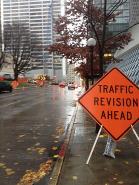 WSDOT, in collaboration with the Washington Division, hosted Michele Palicka, Realty Specialist in the FHWA Resource Center, in presenting the “NEPA and Right-of-Way” class to local public agencies (LPA) in Washington. Two 1½-day classes were conducted, one on August 14-15 in Olympia for LPAs west of the Cascades and the other on August 17-18 in Spokane for eastside LPAs. The class provided a general overview of the National Environmental Policy Act (NEPA) and ROW programs and focused on the importance of collaboration between the two disciplines. Attendance at the two classes exceeded 70 LPA, consultant, and WSDOT staff. Response to the class was very positive and attendees were particularly enthusiastic about collaborating with their counterparts toward more effective project streamlining.
WSDOT, in collaboration with the Washington Division, hosted Michele Palicka, Realty Specialist in the FHWA Resource Center, in presenting the “NEPA and Right-of-Way” class to local public agencies (LPA) in Washington. Two 1½-day classes were conducted, one on August 14-15 in Olympia for LPAs west of the Cascades and the other on August 17-18 in Spokane for eastside LPAs. The class provided a general overview of the National Environmental Policy Act (NEPA) and ROW programs and focused on the importance of collaboration between the two disciplines. Attendance at the two classes exceeded 70 LPA, consultant, and WSDOT staff. Response to the class was very positive and attendees were particularly enthusiastic about collaborating with their counterparts toward more effective project streamlining.
Prior to 2013 the Washington 2-week bridge inspector training course was a FHWA approved equivalent to the National Highway Institute (NHI) “Safety Inspection of In-Service Bridges” 2-week course. As part of the full updating of this course the WSDOT Local Programs Bridge Engineer and the FHWA Washington Division Bridge Engineer updated course material needed to complete the applicable presentations, participants work books, and instructor guide to be used throughout the course. The course was hosted in September 2016 and again in March 2017. Over 50 individuals completed the newly certified 2-week course and approximately 30 new team leaders have been certified to inspect bridges in Washington based on taking this course along with completing/providing the necessary qualification documentation. The hosting of this WSDOT BCIT course has been a significant contribution and cost savings to both the agency and individuals within Washington for inspection certification and bridge inspection program management.
On August 29-30, the Division Civil Rights Program Manager, in response to a request from WSDOT’s Office of Equal Opportunity (OEO), conducted Title VI training for 15 WSDOT employees – many of whom were new hires. The 1 1/2-day training session focused on the various elements of FHWA’s Title VI program requirements, including development of a Title VI Plan, data collection, program area reviews, sub-recipient compliance, complaint processing, monitoring and enforcement, and reporting. In addition, at the request of WSDOT’s Metropolitan Planning Office, the training was again conducted for the State’s MPOs/RTPOs (and some WSDOT staff). Two one-day sessions were held – one on August 23 in Seattle (19 participants), and another on September 13 in Yakima (16 participants). These sessions provided participants with a basic understanding of Title VI (the law) and associated regulatory requirements (as a recipient / sub-recipient of Federal financial assistance).
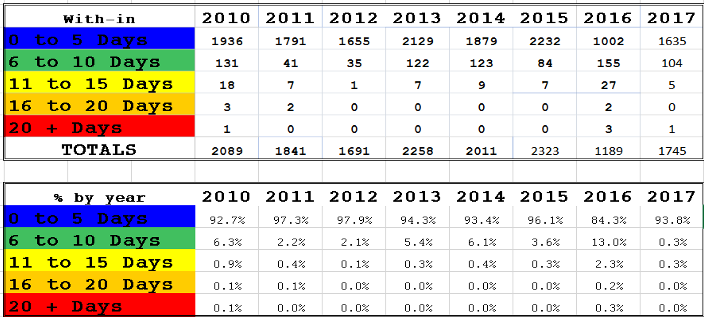
The tables above reflect the number of days taken by the FHWA Washington Division to approve authorizations / modifications submitted into the Financial Management Information System (FMIS) from WSDOT. (Our Stewardship & Oversight agreement states we will turn around requests within 5 days or less). For Federal Fiscal Year (FFY)2017 1635 out of 1745 FMIS requests were approved within 5 days or less which calculates out to 94%. This is an improvement of 10% from FFY2016 year end percentage of 84%.
INACTIVE PROJECT PERCENTAGES AND TOTAL NUMBER OF INACTIVE PROJECTS
A total of 319 projects were inactive in the third and fourth quarters of FFY2017 (150 and 169), representing an inactive percentage of 1.8% and 1.6%, respectively. FHWA’s quarterly target is under 2% inactivity of total obligated Federal funds. The quarterly inactive percentage is found by dividing all inactive projects (projects with no expenditures processed for 12 months or more) total unexpended obligation by each state’s total annual fiscal year apportionments.
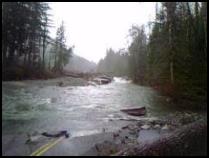 On April 14, 2017, the Washington Division Administrator signed a Finding of No Significant Impact (FONSI) for Snohomish County’s Index-Galena Road project. The FONSI is based on the Environmental Assessment (EA) issued on September 19, 2016, by FHWA, WSDOT, and Snohomish County Public Works. This is a significant
On April 14, 2017, the Washington Division Administrator signed a Finding of No Significant Impact (FONSI) for Snohomish County’s Index-Galena Road project. The FONSI is based on the Environmental Assessment (EA) issued on September 19, 2016, by FHWA, WSDOT, and Snohomish County Public Works. This is a significant  milestone for this emergency relief project. The road was permanently overtaken by the flooded North Fork Skykomish River in November 2006 and has been closed ever since, inconveniencing local residents and limiting recreational access that is important to outdoor enthusiasts and the local economy they support. The repairs to Index-Galena Road would restore a vital corridor that connects to homes, campgrounds in the area, and provides access to a multitude of recreational activities in the Mt. Baker-Snoqualmie National Forest. Preliminary design for the repairs to the Index-Galena Road has been completed with construction estimated to begin in 2018.
milestone for this emergency relief project. The road was permanently overtaken by the flooded North Fork Skykomish River in November 2006 and has been closed ever since, inconveniencing local residents and limiting recreational access that is important to outdoor enthusiasts and the local economy they support. The repairs to Index-Galena Road would restore a vital corridor that connects to homes, campgrounds in the area, and provides access to a multitude of recreational activities in the Mt. Baker-Snoqualmie National Forest. Preliminary design for the repairs to the Index-Galena Road has been completed with construction estimated to begin in 2018.
The Division Administrator, Assistant Division Administrator, Field Operations Team Leader, Area Engineers, and Program Managers visit each WSDOT Region annually to further our partnership and evaluate our customer service. WSDOT Region leadership and management staff attend as well as project personnel. These “listening sessions” give the Regions an opportunity to describe their upcoming program and projects and coordinate early with the Washington Division for its involvement and approvals. The Regions are encouraged to share inefficiencies with FHWA, best practices, and training needs. Also, Division staff informs the Regions of any changes in FHWA policy and findings of any reviews completed. In addition, the Region is informed of upcoming reviews in which their staff may be involved. This year all the Regions talked highly of the ROW program manager, the technical assistance he’s given, and the changes in flexibilities he’s working on. They also praised our environmental streamlining efforts and wished for more programmatic agreements with other resource agencies. Each Region also expressed their appreciation with the Division’s quick response on Emergency Relief sites. We heard there are concerns with using more Design-Build and the need for more training. The Regions also expressed interest in worker safety, work zone crashes, and innovations with automation and moveable barriers. In addition, most Regions discussed issues associated with the American’s with Disabilities Act (ADA) compliance on sidewalks when owned either privately or by a LPA. The listening sessions help strengthen our partnership with WSDOT in order to more effectively, efficiently, and uniformly deliver the federal-aid program throughout Washington.
In August, the Division ROW Program Manager, gave a basic overview of the Uniform Act and some related ROW matters to Oregon DOT (ODOT) engineers, project managers, and environmental staff. The presentation, “ROW 101 for Non-ROW Specialists”, was recorded and posted on ODOT’s website (http://www.oregon.gov/ODOT/ROW/Pages/ROW.aspx). The link to the videos (the presentation is in two parts roughly one hour in length each) willone to a page entitled “Right-of-Way Guidance”.Then scroll down to “Additional Materials” and the first box under that is “Right-of-Way 101 Training”. Clicking in that box will give the option to open Video Part 1, Video Part 2, and the PowerPoint presentation.
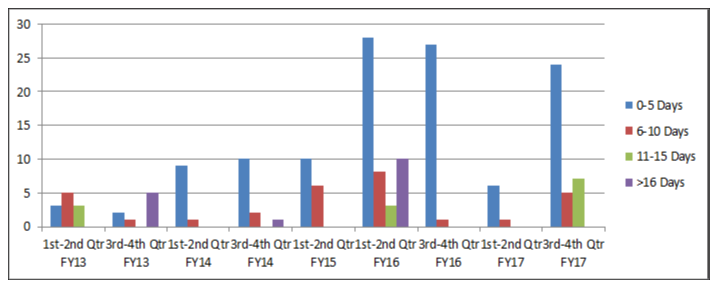
This chart shows the timeliness of FHWA Washington Division approval for emergency relief (ER) damage inspection reports. Our goal is to approve 90% of these reports within 10 days of receipt. ER reports that exceed 16 days are delayed typically due to external permits, need for additional information, and other factors.
The Division office coordinated with the FHWA Resource Center to bring a 2-day interactive workshop on Construction Manager/General Contractor (CM/GC) on July 12-13, 2017 to Spokane, WA. The workshop provided participants insight on when, where, why, and how to use the CM/GC delivery method to save time and money on projects. The workshop was delivered in response to a local agency request for guidance on CM/GC delivery processes. The workshop participants included requesting local agency, WSDOT, an individual from Montana DOT, and FHWA staff.
 In response to WSDOT’s request for guidance the Division office coordinated with the FHWA Resource Center to bring a 1-day interactive Part-time Shoulder Use (PTSU) workshop on May 11th to Olympia, WA. The workshop provided planning, designing, and operating guidance from the recently published FHWA guide, “Use of Freeway Shoulders for Travel.” This guide is designed to assist agencies in advancing PTSU concepts as a traffic management strategy in the implementation of a performance-based practical design approach. The workshop provided WSDOT with best practices and lessons learned from other states that have successfully implemented PTSU. Participants included, WSDOT, Sound Transit, FHWA staff, and an individual from the Virginia DOT who highlighted the challenges, obstacles, and evolution of PTSU as part of their active traffic management program. (Photo source Metro Transit)
In response to WSDOT’s request for guidance the Division office coordinated with the FHWA Resource Center to bring a 1-day interactive Part-time Shoulder Use (PTSU) workshop on May 11th to Olympia, WA. The workshop provided planning, designing, and operating guidance from the recently published FHWA guide, “Use of Freeway Shoulders for Travel.” This guide is designed to assist agencies in advancing PTSU concepts as a traffic management strategy in the implementation of a performance-based practical design approach. The workshop provided WSDOT with best practices and lessons learned from other states that have successfully implemented PTSU. Participants included, WSDOT, Sound Transit, FHWA staff, and an individual from the Virginia DOT who highlighted the challenges, obstacles, and evolution of PTSU as part of their active traffic management program. (Photo source Metro Transit)
The Division office coordinated with the FHWA Resource Center to bring a 2-day interactive workshop on the Highway Capacity Manual (HCM) Sixth Edition Workshop to Olympia on September 13-14, 2017. The workshop focused on recent updates related to alternative intersections and freeway uninterrupted flow. WSDOT’s interest was in how these recent updates aided in the project planning phase, in the application to support design-based practical solutions, and in the analysis of diverging diamond interchanges and alternate intersections.
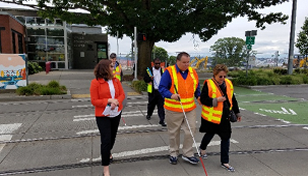 On June 14 and 15, 2017 FHWA hosted a workshop on Innovative Roadway Design and Accessibility in Seattle. This workshop on shared street design is part of FHWA’s ongoing research project on Innovative Roadway Design and Accessibility. This 2-day workshop began with presentations from FHWA Office of Infrastructure and Toole Design Group describing the research project and some of the features of the sites the group would be visiting. The three site visits included city of Seattle’s separated bike lanes in two separate locations and a shared street in another location. The workshop brought together street design practitioners with accessibility design experts and stakeholders in a collaborative problem solving environment. The workshop included participants from the deaf and/or deaf/blind community, the Access for Blind organization, as well as transportation representatives from WSDOT, City of Seattle, Vancouver (Canada), and FHWA Washington Division. The workshop focused on the extent to which new and emerging street designs and practices, such as shared streets and separated bike lanes, are meeting the needs of people with disabilities. (specifically regarding navigation for pedestrians with vision disabilities). A key outcome of the project will be a summary planning and design resource on shared streets that will identify navigational challenges for pedestrians with vision disabilities and provide a toolbox of design strategies for addressing these challenges.
On June 14 and 15, 2017 FHWA hosted a workshop on Innovative Roadway Design and Accessibility in Seattle. This workshop on shared street design is part of FHWA’s ongoing research project on Innovative Roadway Design and Accessibility. This 2-day workshop began with presentations from FHWA Office of Infrastructure and Toole Design Group describing the research project and some of the features of the sites the group would be visiting. The three site visits included city of Seattle’s separated bike lanes in two separate locations and a shared street in another location. The workshop brought together street design practitioners with accessibility design experts and stakeholders in a collaborative problem solving environment. The workshop included participants from the deaf and/or deaf/blind community, the Access for Blind organization, as well as transportation representatives from WSDOT, City of Seattle, Vancouver (Canada), and FHWA Washington Division. The workshop focused on the extent to which new and emerging street designs and practices, such as shared streets and separated bike lanes, are meeting the needs of people with disabilities. (specifically regarding navigation for pedestrians with vision disabilities). A key outcome of the project will be a summary planning and design resource on shared streets that will identify navigational challenges for pedestrians with vision disabilities and provide a toolbox of design strategies for addressing these challenges.
| For more information contact: | ||
|---|---|---|
| Dan Mathis Division Administrator FHWA Washington Division 360-753-9480 Daniel.Mathis@dot.gov |
Bruce Moody Program Management Analyst FHWA Oregon/Washington Division 503-316-2542 Bruce.Moody@dot.gov |
 |